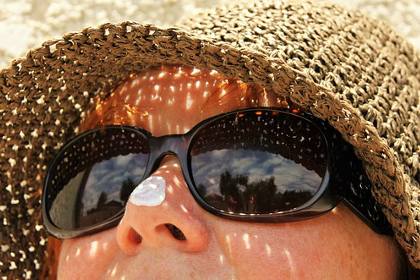
Sunscreen Won’t Prevent Skin Cancer but Some Could Actually Cause It
Does wearing sunscreen prevent skin cancer? If you listen to public health officials that urge every man, woman and child to slather on sunscreen every day, you would think the answer is an unequivocal yes.
Aside from those who use sunscreen for the purpose of preventing wrinkles, it's a safe assumption that many people use it with the intent of preventing skin cancer. But here's the rub: wearing sunscreen may not actually protect you from cancer and, in some cases, may actually increase your risk.
August 23, 2016 | Source: Mercola.com | by Dr. Joseph Mercola
Does wearing sunscreen prevent skin cancer? If you listen to public health officials that urge every man, woman and child to slather on sunscreen every day, you would think the answer is an unequivocal yes.
Aside from those who use sunscreen for the purpose of preventing wrinkles, it's a safe assumption that many people use it with the intent of preventing skin cancer. But here's the rub: wearing sunscreen may not actually protect you from cancer and, in some cases, may actually increase your risk.
Daily Sunscreen Use Versus Occasional Use: No Difference in Skin Cancer Rates
A Cochrane Review attempted to determine whether the use of topical sunscreen and physical sun-protective methods (such as wearing protective clothing, hats, and seeking shade) prevented the development of basal cell carcinoma (BCC) and cutaneous squamous cell carcinoma (cSCC) compared to taking no precautionary measures.1
There wasn't much data on the topic to be found, so the review includes the results of just one study, which compared the daily application of sunscreen with the occasional use of sunscreen over a period of 4.5 years.
Among the more than 1,600 Australian participants, there was no difference between the numbers of people who developed BCC or cSCC (the most common types of skin cancer) in the two groups during the trial period.
As noted in the Cochrane Review, "So, there did not seem to be a difference in applying sunscreen daily compared with using it occasionally."2
While I certainly don't recommend spending so much time in the sun that your skin gets burned, the one-size-fits-all recommendation from public health officials to apply sunscreen daily may be causing more harm than good.
The fact is, sunlight offers many benefits to your health, the majority of which are only beginning to be understood. Meanwhile, most sunscreens contain harmful chemicals and may not protect your skin from overexposure the way you think they do. Some may even increase your risk of cancer.
Certain Sunscreens May Speed the Development of Skin Cancer
Close to 16 percent of U.S. sunscreens contain vitamin A, which sounds like a natural addition that might be beneficial for your skin, acting as an antioxidant.
However, retinyl palmitate, a form of vitamin A, has been found to promote the development of skin tumors and lesions when applied topically and exposed to sunlight.3
The U.S. Food and Drug Administration's (FDA) National Center for Toxicological Research (NTP) has been studying the ability of vitamin A ingredients to trigger skin cancer when exposed to the sun for more than a decade.
One study on hairless mice revealed that the development of skin tumors was accelerated when a vitamin-A-laced cream was applied to the mice and then exposed to ultraviolet light daily for one year.4
Despite the known risks, these ingredients are still found in sunscreens with no warnings to consumers. The Environmental Working Group (EWG) reported:5
"Six years after EWG sounded the alarm about retinyl palmitate, the FDA still hasn't completed follow-up studies that will allow the agency to take a position on the safety of vitamin A and related chemicals in cosmetics and sunscreens.
Most cosmetics companies have not removed these ingredients from sunscreens and other skin and lip products … EWG calls for sunscreen makers to voluntarily stop adding this ingredient to sunscreens until there is proof that it can be safely used on sun-exposed skin. …
EWG recommends that consumers avoid sunscreens and other skin and lip products containing vitamin A, retinyl palmitate, retinol, retinyl acetate, retinyl linoleate and retinoic acid."
